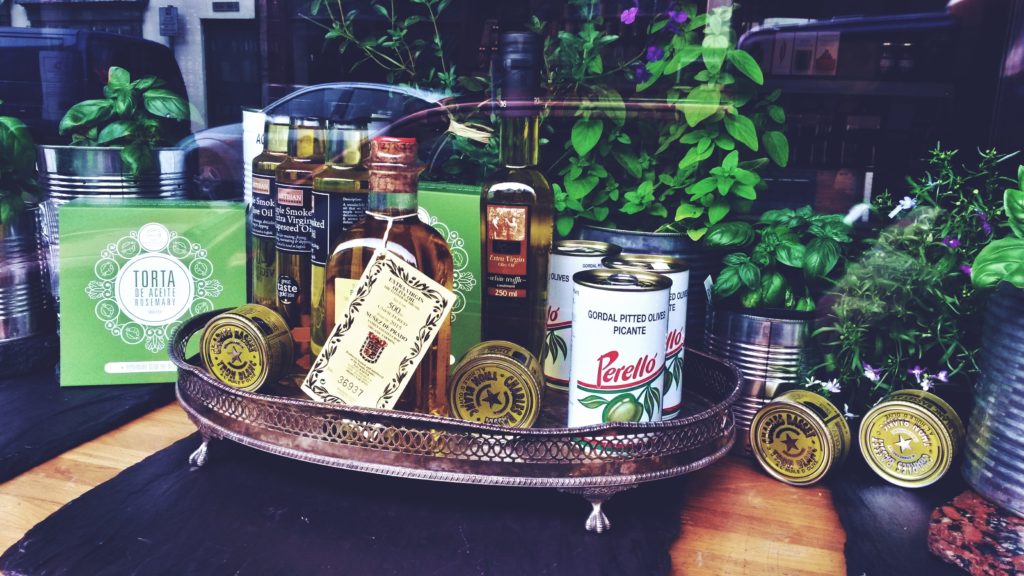Does the rainbow of the Mediterranean Diet lead us to the answer for good health and longevity?
How tempting is the thought of the Mediterranean diet? Can you even hear the words without being invited to a vision of glowing sunset over a sparkling sea or golden sands edged by fragrant vegetation? Are you taken to a place of relaxed tranquil warmth or of lively socialising? Maybe you even see a glass of red wine! And to hear that you can embrace the Mediterranean for good health might seem to be the proverbial icing on the cake.
But what is the Mediterranean diet? Is it in fact the pizza or pasta with some scattered olives and sun-dried tomatoes accompanied by a glass of red wine? Can a Mediterranean diet really support our health?
It should be no surprise if the mention of the Mediterranean brings to mind images of the sea, because the countries of the Mediterranean Basin surround the Mediterranean Sea.
Twenty-three countries are included in the Mediterranean region, in Southern Europe, the Levant and North Africa, characterised by mild, rainy winters and hot dry summers. These countries are not unified by a single diet but diets are varied in the Mediterranean region.
Also, like so much of the rest of the world, it is true to say that the modern diet in some of the Mediterranean countries has evolved from their traditional patterns of eating.
Evidence-based research
Is there a prospect that the benefits of the Mediterranean diet might elude us in this mystery of its definition? What is the reality behind a Mediterranean diet to support good health? These questions are answered by the facts of evidence-based research.
Soon after World War II, the Seven Countries Study established the reputation of Mediterranean eating patterns because of the good cardiovascular health of residents on the island of Crete. Many further studies support the evidence of benefits of this pattern of eating for a range of health conditions, including protection from diabetes, defence against chronic diseases, reducing inflammation, lowering the risk for cardiovascular disease, supporting weight loss and improving fertility.
The basis of the Mediterranean Diet
Knowing that the reputation of a Mediterranean diet is justified, what is the food that defines the diet? The basis of the diet featured in the research is the eating patterns on Crete in the 1950s.
The fundamental principle is to include core foods to eat every day: whole grains, vegetables, fruits, beans, herbs, spices, nuts and healthy fats such as olive oil. Additionally, portions of fish and seafood should be eaten twice a week. Portions of dairy foods and eggs should be moderate. Poultry should be eaten only occasionally and red meat less often.

The Mediterranean diet is often referred to as the Rainbow diet. How apt therefore that this article is published in the midst of the coronavirus epidemic, at a time when we are using the rainbow as a symbol of hope, thanks and support for the wonderful work of the NHS. And also a time when, perhaps, we are increasingly aware of the need to support our health by optimising our diet to strengthen our immune defence systems, with the antioxidants of vegetables and fruit from the rainbow of colours of the Mediterranean diet.
Adopting the Mediterranean diet, not just during this pandemic but on a permanent basis, is a certainly good starting point.
Olive oil, herbs and red wine
Many aspects of the Mediterranean diet have been the focus of studies to find the answers underlying success of the diet. Olive oil has been a feature in research into the special ingredients which are so beneficial.
The lifestyle has been considered, with the value attached to the social occasion of a meal, activating the parasympathetic nervous system to promote effective digestion of food.
The herbs (such as oregano, parsley, basil, rosemary, thyme) may have qualities which enhance the therapeutic effects of the food.
Even the red wine, which may be drunk to accompany food in moderate quantities, has come under the spotlight of research. Is the secret of red wine revealed by the powerful antioxidant, resveratrol, found in the skins of red grapes?
The varied aspects may each contribute to the value of the Mediterranean diet, although it is unlikely that the amount of resveratrol in red wine is significant for therapeutic purposes. It is highly likely the vegetable intake (providing fibre and high levels of antioxidants) has a significant impact, and the role of synergy between the different aspects contributes to the beneficial effects.

Diet has a powerful role in supporting wellbeing as we hear more and more about the impact of diet and lifestyle on the development of disease. The evidence has shown that the Mediterranean diet, typified by the eating patterns on Crete in the 1950s, is likely to be beneficial for health.
Adopting the principles of the Mediterranean diet is likely to be supportive of your health. If you suspect you have a medical condition, however, it is important to consult your doctor for advice, diagnosis and treatment. A personalised nutrition plan, based on a holistic assessment of your health, may support you to improve your health.
It seems, then, that the Mediterranean diet is not about the pasta and the pizza. Neither is it about the icing or in fact about much cake. However, the olives and the sun-dried tomatoes feature in this eating pattern with a basis of a range of traditional foods which do not have to be confined to the Mediterranean region. And the tip for red wine? If you wish to enjoy an occasional glass of red wine, drink it with your meal. A healthy lifestyle is to be enjoyed!
Additional research and information on the Mediterranean diet: oldwayspt.org


Jane Hickey is a registered nutritional therapist. She practises in Chelmsford and Purleigh, creating individualised plans for clients to support their health and wellbeing.
Website: janehickeynutrition.com
Telephone: 07305 531583
Email: jane@janehickeynutrition.com


51 Comments
[…] are you considering the environment but you are being kinder to yourself and your family because a Mediterranean Diet is best for good health and longevity and that diet is based on whole grains, vegetables, fruits, […]
[…] Mediterranean diet is recommended for general good health. It is particularly good for people with bowel problems as […]
[…] The Mediterranean Diet is recommended as the best possible option for good health and longevity. The is predominantly a wholefood, plant-based diet with fish and seafood eaten twice a week and chicken even less often. (But no red meat!) […]
[…] Mediterranean Diet focusing on whole grains, vegetables, fruits, beans, herbs, spices, nuts and healthy fats such as […]
[…] older, taking vitamins with a clean diet helps keeps our strands strong. Consider a wholefoods Mediterranean Diet to maximise the nutrients in your […]
[…] majority of nutritionists now recommend a Mediterranean Diet which includes red meat only very […]
[…] fruit and vegetables are the mainstay of the Mediterranean Diet and, if followed, would provide plenty of vitamin C. However, many people who struggle to meet […]
[…] majority of health professionals now recommend a Mediterranean Diet as the healthiest option, which is predominantly plant-based but also includes a moderate intake of […]
[…] the Mediterranean Diet, often called the rainbow diet, also suggests that portions of fish and seafood should be eaten […]
[…] maintain a healthy weight, we need to eat a healthy diet which contains all the nutrients we need. We need to avoid processed foods as much as possible and […]
[…] we should aim to obtain as many essential nutrients as possible from our food and adopting a Mediterranean Diet can help us do that. But sometimes other aspects of our life take over and fitting all the right […]
[…] in the detail, almost all nutritionists recommend following the principles of a plant-based Mediterranean Diet which includes not only veggies, but also whole grains, beans, herbs, spices, nuts and healthy […]
[…] note that food supplements cannot be substitutes for a varied and balanced diet and a healthy lifestyle. StemEnhance Ultra® is a food supplement which is not intended to treat, […]
[…] In a nutshell, a gluten free diet looks very much like a typical healthy diet. Foods such as nuts, seeds, beans, lean meat, fish, fruits, and vegetables are the staples of a gluten free diet. With a little bit of adjustment, you can still be enjoying a super healthy Mediterranean Diet. […]
[…] and seeds are a key feature of the Mediterranean Diet and are highly recommended as an alternative source of protein for anyone on a vegan on vegetarian […]
[…] a healthy diet, get enough exercise, and avoid sitting for too long at […]
[…] what emotions can do is lower our natural defences. For example, if you are under a lot of stress, neglect your diet and do not get enough sleep, your immune system will soon become impaired, which can leave you open […]
[…] there is a great deal we can do to make a substantial difference including, for example, adopting a plant-based diet and reducing our levels of consumerism. Do you really need that new jumper? Do you really need the […]
[…] should relate to your goals and existing physical condition A general diet such as the Mediterranean Diet may be suggested, or a clean-eating diet that will help you lose weight and feel great, or maybe […]
[…] most nutritionists do recommend a Mediterranean style diet as being the healthiest option, which is a predominantly a whole food plant-based diet that […]
[…] that in cases where people who are excessively obese and have failed to lose weight through a healthy diet and exercise are more vulnerable to serious health conditions such as type 2 diabetes or high blood […]
[…] course, one of the most important aspects in restoring your body to health and fitness is a healthy diet. And that is even more important if you are breastfeeding. So don’t be tempted to snack on sugary […]
[…] people now realise that eating a wholefood plant-based diet is also the best option for our health and for the environment, so if growing your own fruit and […]
[…] There are several ways to feel better during today’s challenging times: sleeping well, eating healthy, and concentrating on your mental health. But whilst beauty may only be skin deep, looking good can […]
[…] sugary foods and drinks should be avoided all the time! It’s so important to focus on a healthy diet.) should be avoided all the time!) because they create plaque which is difficult to remove if you […]
[…] is impossible, though. Staying on track is mostly mind over matter – make exercise and healthy eating part of your daily routine and you’ll never have to worry that you’re not making […]
[…] if possible. So, as it is now officially summertime, it is a great time to really focus on a Mediterranean […]
[…] cardiovascular health and decreased risk of diabetes type 2. There are many commonalities between a Mediterranean Diet and a low GI […]
[…] a rainbow of fresh fruit and veg into our diets can help to protect our eyes from age-related conditions. Berries, nuts, dark leafy […]
[…] A wholefood, plant-based diet is certainly the healthiest option. Simply start with including a vast amount of different fruit and vegetables into your diet and you can begin feeling the benefits within just days. […]
[…] peas, leeks, broccoli, or kale (to name a few). On that note, almost everyone has heard the term ‘Mediterranean diet’ floating around. For many researchers, it was the long life-expectancy associated with the […]
[…] that you are getting the magnesium your body requires. These foods form the basis of the Mediterranean diet which is generally accepted as the best option for good […]
[…] but too much of anything is bad. Make sure you keep its usage in check while also maintaining a good diet and healthy […]
[…] living walls and roof gardens, a desire to be more self-sufficient, and more people changing to a plant-based diet, hydroponics are now becoming quite […]
[…] your diet are to dramatically reduce the amount of highly processed foods and to adopt a more plant-based diet. That does not necessarily mean you need to go vegan or vegetarian but have some meals without meat […]
[…] on a Mediterranean style diet is a great way to incorporate healthy food ideas that will help you manage your type 1 […]
[…] a plant-based, Mediterranean-style diet is now universally recommended by medical practitioners as the most healthy eating […]
[…] contributed to the well-being of Spain’s long-lived population. What is special about the Mediterranean diet? The Mediterranean diet is based on fresh traditional foods, such as olive oil, seafood, and […]
[…] your own meals from whole ingredients is the key to healthy eating. Processed and packaged foods contain large amounts of salts, sugars, and fats that act as […]
[…] might seem surprising, but eating a Mediterranean diet is not only good for your general wellbeing but also a great way to improve your eye […]
[…] course, achieving good health and wellbeing isn’t about just one thing. You need to eat a wholesome diet, exercise, and ensure you get enough sleep – as well as dumping some of the habits you know […]
[…] you notice in your appetite, it’s important to listen to your body and eat when you’re hungry. Eating healthy foods will help improve your mood and give you the energy you need to continue working on your mental […]
[…] the temptation to snack on unhealthy goods and, if they are well-balanced meals such as in a Mediterranean diet, help you concentrate and be productive. Irregular eating can also negatively impact other areas of […]
[…] Add these together with the rainbow of different coloured veggies to form the basis of a healthy Mediterranean diet. […]
[…] Avoid foods fried, fatty, or sugary foods. These can cause breakouts and blemishes to develop on the skin. Eat plenty of fruit and veg, nuts, and whole grains, fish and lean meat, although red meats should be consumed infrequently in a healthy Mediterranean diet. […]
[…] Make sure you’re still eating the required amount of calories your body needs and, importantly, good quality natural foods that contain sufficient vitamins, minerals, proteins and […]
[…] must watch your health with care and diligence. Keeping fit, eating healthily, not smoking and reducing consumption of alcohol can all help reduce the likelihood of developing […]
[…] sure you have a healthy diet with plenty of iron, fatty acids, and vitamin B-complex can help make your tresses look glossy and […]
[…] is generally accepted that a Mediterranean-style diet, rich in fruit, vegetables and whole foods with minimal red meat is one of the healthiest options. […]
[…] professionals agree that a Mediterranean diet provides the best basis for healthy eating. If you are vegan or vegetarian, pay particular […]
[…] Mediterranean Diet rich in wholefoods, fruit and vegetables is promoted by the majority of health practitioners as the […]